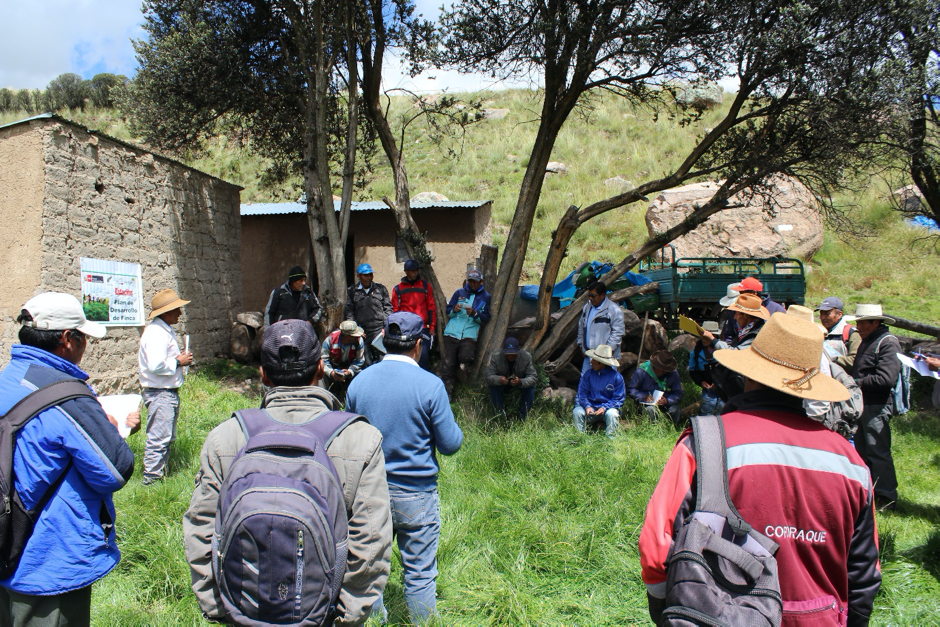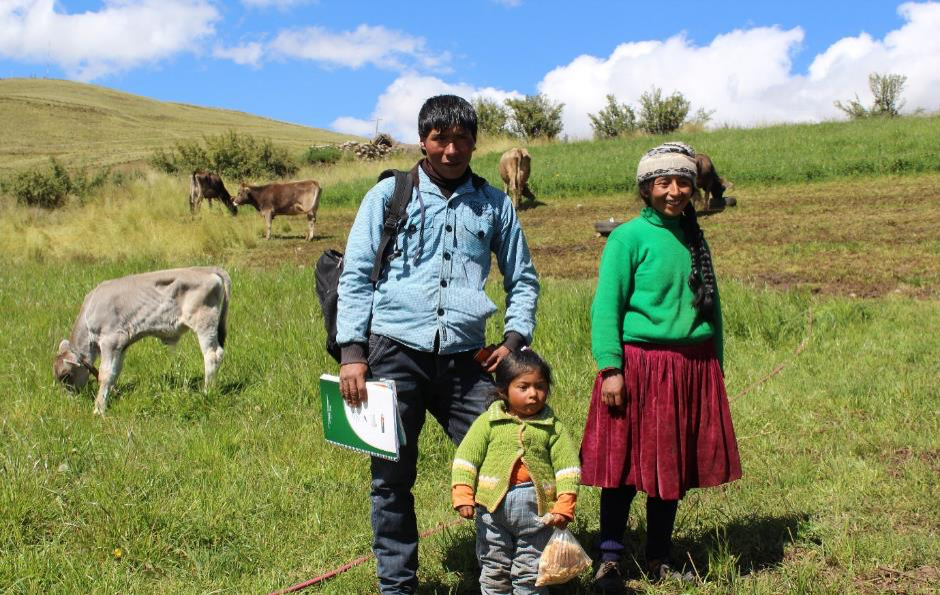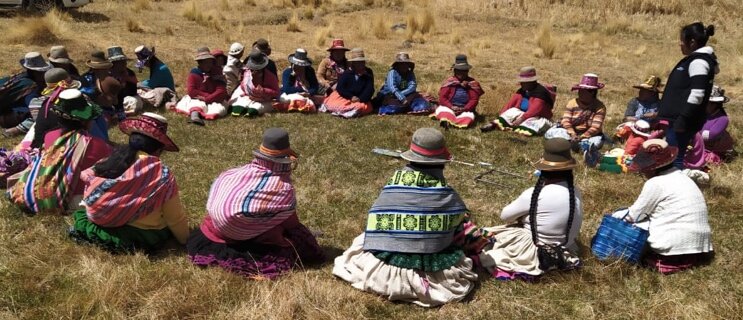Smallholders are the best extension agents in the Peruvian Andes Mountains
How to equip thousands of widely dispersed farmers across the Peruvian Andes with the knowledge of how to apply good dairy farming practices and improve their families’ livelihoods? By training a small number of farmers to become extension agents in their local area. At the start, the New Zealand Peru Dairy Support project encountered many difficulties by employing state-run Research & Extension professionals. Since then, local smallholder farmers have been taking on the role as an extension agent instead, and three years down the track, the project is starting to see excellent outcomes with good prospects for the future.
Field days are delivered in the native language to empower participating farmers, especially women.
Dairy farming in the Peruvian Andes is of mostly small-holder nature (4-6 cows/family) and of relatively recent development. In fact, over the last two decades, dairy farming at altitudes in the range of 3500 to 4200 m has grown rapidly, replacing camelids and sheep farming that once predominated. High altitude Andean ecosystems pose many constraints for dairy farming - hypoxia and high UV radiation, high variation between day and night temperatures, short rainy season, and hence the shortage of feed and water; and not less importantly, accelerated climate change. Dairying growth has been catalysed by subsidies from state organisations, mining companies and non-governmental organisations. High inputs typically characterise the system. Large cows with genetics suitable for feedlot systems of the lowlands are fed high price concentrates and low quality oats hay, while the use of pastures is neglected. Under these conditions, not only are productivity and profitability low, but there are high negative environmental impacts and issues of poor animal welfare.
Research and extension supporting dairy farming in the Andes
Peru lacks institutionalised research and extension (R&E) services to support farming. Research and Extension institutions have a high turnover of staff. Particularly senior positions frequently change due to political appointments and with them also the related team. Research tackling current issues of high-altitude livestock farming is almost non-existent, and extension in support of farmers is dispersed, poorly funded, of short-duration (a few months) and focused on technology transfer (artificial insemination, embryo transfer and the use of supplementary feed). There is no systems approach to address the complexity of Andean livestock farming development. The numerous initiatives from the institutions promoting farming are directed to remediate recurrent problems. For example, to tackle stock mortality during the cold season, the institutions build cow sheds and deliver veterinary drugs and oats hay - in short, actions that are unsustainable and of little impact.
Field days to create awareness for change.
Can small-holder dairy farmers in the Peruvian Andes fulfill the role of extension agents? The short answer is “Yes”.
The personnel delivering technology transfer in the Andes are often unfit to provide sound advice because their university training only focused on feedlot production systems. Most of these professionals, once in action in the Andean zone, try to implement feedlot principles where resources are unsuitable for such a system. This technology transfer ultimately attempts to ‘adapt’ the environment to the requirements of an exotic system, and makes its operation utterly dependent on continuing subsidies. What is worse is that most of these professionals are unwilling to listen and learn.
Reasons supporting motivated farmers as extension agents
Farmers know their business and the farming environment better than anyone else;
Lack of institutionalised, consistent and suitable extension system from the state;
Farmers directly experience the benefits of changed farming practices. Farmers are aware of the need to change and are keen to learn from other farmers already undertaking these changes and achieving improved results;
Small-holder farmers are naturally system thinkers. They know the real world, any loss in stock or bad decisions imply huge setbacks. To avoid risks, they adopt new practices by observing cause and effects;
Farmers are fully engaged in the process of learning and listening when other farmers demonstrate their achievements and learning experiences;
The role of women in farm management is particularly important as they feel very connected to their stock. They feel happy when their cows are happy.
Small-holder farmers in the Andean zone use their native language (Quechua/Aymara) to communicate among themselves. Communication with professionals is in Spanish. Language can be a barrier.
Farmers feel empowered when participating at extension events in their native language.
Farmers prefer to attend training events in the field instead of in a classroom. Farmers as extension agents are facilitators of the process of learning in the field, doing things.
Small-holder farmers mistrust the ongoing efforts of the transfer of technology from institutions. The extension professionals are unfamiliar to them and they do not see the purpose of being told a certain recipe delivered out of context in a classroom.
Small-holder farmers as agents of extension have the great advantage that they are located on site, where the service is needed, available 24/7.
Farmers as agents of extension are easily accessible and most of the time for free (reciprocity).
And at last, small-holder farmers as agents of extension are a powerful means of training other farmers as agents of extension.
Experiences of the impact of farmers fulfilling the role of extension agents in Peru
The New Zealand Peru Dairy Support Project (NZPDSP) is a 4-yr joint New Zealand / Peruvian Government development initiative, with funding from the New Zealand Aid Programme of the Ministry of Foreign Affairs, and, the Ministry of Agriculture and Irrigation of Peru (MINAGRI). The AgriBusiness Group manages the project, which started in October 2016. Initially, the design of the project intended to train a large group of staff from MINAGRI as Officials of Extension, but this objective could not be met because of the obstacles described above. Thus, the project's medium and long term objective to reach out to 1000s of farmers dispersed over large areas is now realised with the support from trained farmers both on animal husbandry as well as on extension principles. The project staff runs field days on small-holder farms to create awareness. At these events, the most motivated farmers are identified, with subsequent visits to their farms, individual training, and mentoring to improve their practice, until they feel fully confident and can then take on the role as a farm extensionist. The NZPDSP is liaising with the Peru qualification authority (SINEACE) to develop qualifications and certification systems to recognise the role of these farmers.
Discussion group on how to conduct a soil test. A farmer is demonstrating the test and teaching other farmers.
Some criteria that farmers should meet to be trained as extension agents
Young motivated family - husband and wife should have a clear will to make changes.
Farming should be the most important source of income. In the case of dairy farming, they should not have other livestock on the farm.
The family farm should be strategically located, i.e. visible to passers-by. The farmer should be willing to host visitors.
The farmer should be fluent in the local native language.
Decision-making responsibilities on the farm should be clearly laid out. In most cases, women are in charge of looking after the cows, whereas her husband looks after the other duties. Often, women have better potential to fulfill the role of an extension agent.
They should have a minimum level of literacy to access training literature.
They need to have some level of flexibility to deliver the extension jobs outside their own farm.
They should have started implementing improved practices on their farms.
Author: Cesar Pinares Patino - Peru Dairy Support Project Co-ordinator






